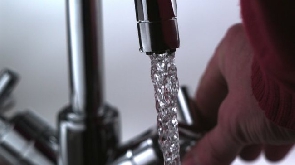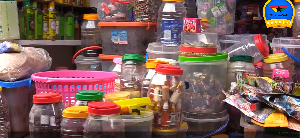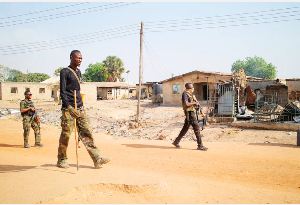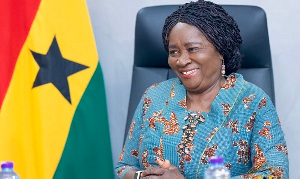Ghana like many developing countries faces a lot of challenges for which citizens expect the government to fix. With resources limited, it comes down to the government’s priority in determining which challenge deserves to be addressed at any particular time.
One can safely say however that, the Sustainable Development Goals (SDG) to which Ghana is a signatory reflects the aspirations of Ghanaians. These goals include elimination of poverty, good health and well-being, quality education, gender equality, clean water and sanitation, decent work and economic growth amongst others. The SDGs are 17 in all.
Ghana has co-chaired the Sustainable Development Goals Advocates for a while now.
SDG 6 relates to clean water and sanitation, which is an area Ghana has not really performed well. Nevertheless, SDG 6 is central to the attainment of the goals relating to agriculture, health, inclusive and equitable education and to some extent poverty eradication.
Furthermore, access to water and sanitation services gives meaning to the right to life and dignity which are inviolable.
Clean water and sanitation are so basic that authorities have to do everything within their power to achieve universal access at all cost. This will require a clear strategy and policy direction from government. The ad hoc provision of water and sanitation facilities is not the solution.
Data on water and sanitation are hard to come by. However, per the Voluntary National Review (VNR) report submitted to the UN by the government of Ghana in 2019 and the Joint Monitoring Programme Report (2017), seventy-nine percent (79%) of the population have access to basic drinking water whereas only twenty-one percent (21%) have access to basic sanitation.
Ghana being a democratic country has changed governments frequently at least 5 times in the last 28 years. A new government may not necessarily continue the plans and strategies of the previous one. That is where the problem lies.
Having good regulatory governance for the water and sanitation sector, a clear financing plan and an innovative implementation strategy is key to achieving SDG 6.
A look at the manifestos of the two largest political parties in Ghana, specifically the aspects relating to water and sanitation gives a clue to the level of seriousness these parties attach to this all important sector.
The largest opposition party has promised a number of things, which include:
Develop Ghana’s water & sanitation sector to improve all citizens’ health,
Optimise agricultural and industrial production to create employment, and build national climate change resilience
Build the capacity of Assemblies to manage water provision and sanitation services with technical support from the Ministry of Water Works and Housing and our Technical Universities
Develop technical and managerial training programmes for Assembly Sanitation Officers to properly manage and supervise the operation of all water resource infrastructure
Ensure the sustainability of water sources by halting reckless projects like the proposed mining of the Atiwa forest that is rapidly depleting our natural water reservoirs through evapotranspiration
Enforce the Water Buffer Policy to reduce the pollution of our water bodies.
Specifically on rural water, the NDC has promised to:
Achieve one hundred per cent (100 %) rural water coverage by 2025 diversify scientifically using available data to construct groundwater, small dams, rainwater harvesting, and floodwater harvesting systems as appropriate in different areas based on the specific resources and needs.
With regards to Sanitation, the NDC promised to:
Establish the Plastic Waste Recycling Fund provided for under the Customs and Excise (Duties and other Taxes) (Amendment) Act, 2013 (Act 863)
Formulate a National Sanitation Policy and strengthen the role of MMDAs in sanitation as enshrined in the Local Governance Act, 2016 (Act 936)
Re-introduce the National Sanitation Day
Launch an aggressive public education programme on water conservation improve liquid waste management working with indigenous businesses to build wastewater treatment and recycling plants first for public institutions that have common sewer systems and then for major industrial establishments, estates, and settlement areas
Empower the Sanitation Courts and enforce sanitation laws.
The NDC manifesto seems to address the regulatory governance challenge relating to the provision of water and sanitation. With a clear source of funding, this proposal looks very achievable.
The NPP on the other hand, indicates in their manifesto that, the government has been building water and sanitation systems, schools and healthcare facilities, small earth dams and dugouts, markets and security infrastructure through flagship initiatives such as IPEP and Zongo Development Fund.
Furthermore, the NPP states that, they have constructed the largest number of places of convenience than any government in the 4th Republic. They assert that, under the Greater Accra Metropolitan Area Water and Sanitation Project, 27,242 household and 238 institutional toilets have been constructed.
They further state that under the Sustainable and Rural Water and Sanitation project, 12,972 household toilets have been constructed and 351 communities have attained Open Defecation-Free (ODF) status.
This manifesto does not give a strategic plan neither does it focus on regulatory governance. What it does is to state the source of funding for such projects and what government has done.
It must be noted that there are institutions and agencies charged with the responsibility of providing water and sanitation such as the Community Water and Sanitation Agency (CWSA), Ghana Water Company Limited (GWCL) and MMDAs.
The governance structure of water and sanitation services in Ghana looks formidable on paper. Empowering the various institutions and ensuring there is much collaboration and also injecting the much needed capital can work the trick in ensuring SDG 6 is achieved by 2030. The CWSA for instance must be more decentralised by having agents at all MMDAs to provide technical support to these MMDAs.
Achieving universal access to water seems very possible, however, a comprehensive strategy will have to be adopted to deal with sanitation in order to achieve the target by 2030.
Whatever the promises of the two leading parties are, it will not be far-fetched to state that what Ghanaian expect from whichever party wins is for all people to have access to at least basic water and sanitation.
Opinions of Thursday, 15 October 2020
Columnist: Stephen Haizel















